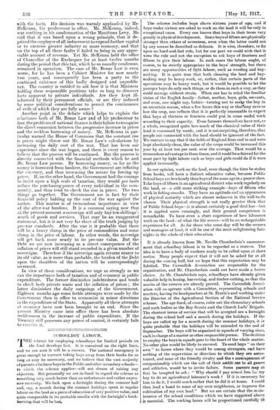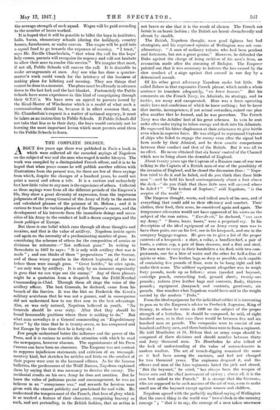SCHOOLBOY LABOUR.
THE scheme for employing schoolboys for limited periods on the land develops fast. It is conceived on the right lines, and we are sure it will be a success. The national emergency is great enough to warrant taking boys away from their books for as long as may be necessary, and we believe that the vast majority ufparcnts who have boys in the Public and other secondary schools— to which the scheme applies—will not dream of raising any objection. But personally we are inclined to regard the scheme as something very much better than an unfortunate and rather expen- sive necessity. We look upon a fortnight during the summer half and, say, a month during the summer holidays spent in regular labour on the land as a piece of education of very positive value, and quite comparable in its probable results with the fortnight's book- iestrnina that will be lost.
The scheme includes boys above sixteen years of age, and if boys under sixteen are asked to work on the land it will be only in exceptional cases. Every one knows that boys in their teens vary greatly in physical development. Some boysof fifteen are physically stronger than others of seventeen, even when the latter could not by any means be described as delicate. It is wise, therefore, to fix upon no hard-and-fast rule, but for our part we could wish that it were the rule and 'not the exception to ask boys of fourteen and fifteen to give their labour In such cases the labour ought, of course, to be strictly appropriate to the boys' strength, but there are many opportunities of light labour, such as weeding and hay- making. It is quite true that both cleaning the land and hay- making may be heavy work, or, rather, that certain parts of the operations may be heavy work, but it would be possible to let the younger boys do only such things, or do them in such a way, as they could manage without strain. When one has in mind the familiar vision of the English family—father, mother, boys, girls, servants, and even, one might say, babies—turning out to make the hay in an uncertain season, when a few hours this way or thatinay save or
lose the crop, one reflects that it is perfectly reasonable to expect that boys of thirteen or fourteen could put in some useful work according to their capacity. Even farmers themselves have net, as a whole, recognized quite how much of the chemical value of their land is consumed by weed; and it is not surprising, therefore, that people not connected with the land should be ignorant of the fact.
We venture to say that if the fields of England from end to end were kept absolutely clean, the value of the crops could be increased this year by at least ten per cent. over the average. That would be a tremendous advantage in these times, and it could be achieved for the most part by light labour such as boys and girls could do if it were applied incessantly.
In our opinion, work on the land, even though the time be stolen from books, will have a distinct educative value, because Public School boys are less handy than boys of the same age in a poorer class. Take boys of fifteen in an agricultural district who work regularly on the land, or—a still more striking example—boys of fifteen who work in fishing.smaoks. They have an aptitude and an appearance of physical maturity which are almost unknown in the well-to-do classes. Their physical strength is not really greater than that of Public School boys—it is almost certainly a good deal less—but it is applied more cunningly, and their general competence is remarkable. To have even a short experience of how labourers work on the land—of what the life means—will be an unforgettable experience for all. As for those who some day will be the owners and managers of land, it will be one of the most enlightening fort- nights in the whole of their education.
It is already known from Mr. Neville Chamberlain's announce- ment that schoolboy labour is to be regarded as a reserve. The idea is to have a body of workers ready to be called upon at short notice. Many people expect that it will not be asked for at all during the coming half, but we hope that this expectation may be falsified. The Cavendish Association are responsible for the organization, and Mr. Chamberlain could not have made a better choice. As Mr. Chamberlain says, schoolboys have already given valuable help in hoeing, harvesting, and timber-cutting, so that the merits of the reserve are already proved. The Cavendish Associ- ation will co-operate with a Committee, representing schools and masters, having its headquarters at St. Ermin's and working under the Director of the Agricultural Section of the National Service scheme. The age fixed, of course, rules out the elementary schools and such bodies as the Boy Scouts and the Church Lads' Brigade. The shortest terms of service that will be accepted are a fortnight during the school half and a mouth during the holidays. If the boys are called up for a month during the summer holidays, it is quite probable that the holidays will be extended to the end of September. The boys will be organized in squads of varying sizes, each in charge of a master or other responsible person. The decision to employ the boys in squads goes to the heart of the whole matter. No other plan would be likely to succeed. To send boys " on their own " to farms where they would be among strangers, and have nothing of the supervision or direction to which they are accus- tomed, and none of the friendly rivalry and the e icouragement of companionship which are the salt of their ambit' ons in all games and athletics, would be to invite failure. Some parents may at first be tempted to ask : " Why should I pay school fees fan my boy to do an agricultural labourer's work ? If it is necessary for him to do it, I would much rather that he did it at home. I could then lend a hand to some of my own neighbours, or improve the cultivation of my own land." But we are certain that the main- tenance of the school conditions which we have suggested above is esseatial. The working hours will be proportioned carefully to
the average strength of each squad. Wages will be paid according to the number of hours worked.
It is hoped that it will be possible to billet the boys in institutes, halls, barns, elementary schools (during the holidays), country houses, farmhouses, or under canvas. The wages will be paid into a squad fund to go towards the expenses of messing. " I trust," says Mr. Neville Chamberlain, " that when the call for the boys' help comes, parents will recognize its urgency and will not hesitate to allow their sons to render this service." We imagine that most, if not all, Public Schools will answer the call. It is desirable to make arrangements at once. Any one who has done a quarter- master's work could vouch for the intricacy of the business of making plans for billeting and messing. They are things that cannot be done in a moment. The plans must be all ready in advance down to the last fork and the last blanket. Fortunately the Public Schools have some experience in this kind of campaigning through their O.T.O.'s. We have seen an appeal to parents issued by the Head-Master of Winchester which is a model of what such a communication should be, because it in effect assumes that, as Mr. Chamberlain's request is a matter of national urgency, it must be taken as an instruction to Public Schools. If Public Schools did not take that line as to their duty, the boys would certainly not be learning the most important lesson which most parents send them to the Public Schools to learn.



























 Previous page
Previous page